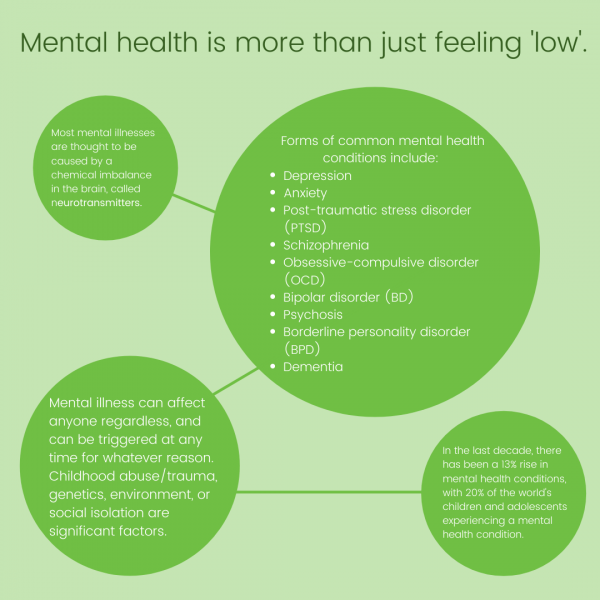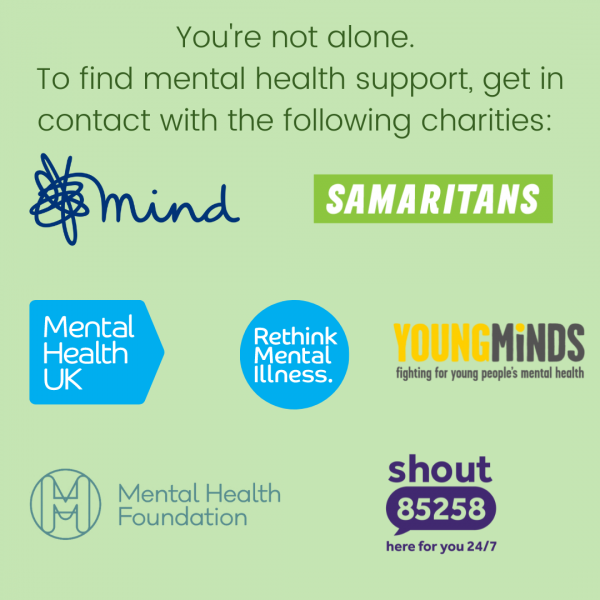
* This post has been written by our previous Social Media Manager. *
There is a common misconception in our society that mental health shouldn’t be treated as urgently as physical health. You get told that you’re just being ‘overly dramatic’ or seeking attention when having an anxiety or panic attack; that you’re lazy if you don’t get out of bed every day. Or you just need to 'forget it and move on' if you’re left traumatised by an event in your life – even if it was years ago. Or that you’re ‘crazy’ if you’re hallucinating.
You want to do nothing but scream or cry, but you just can’t get it out. You keep it secret from your loved ones because you don’t want to feel like a burden. Even just writing out the words on a piece of paper and scrunching it up can sometimes be deflating. You sometimes believe it yourself.
“It’s all in your head!”
But isn’t that the point?
Unfortunately, this is the reality for so many people in the world living with one or more mental illnesses. The attitude surrounding disabilities of the mind is harmful and stigmatising on so many levels. It’s not taken seriously enough to warrant empathy from neurotypical people. Living with a mental disability is like walking straight into a gladiator battle and being pitted against a swarm of ferocious, hungry lions and violent experienced gladiators. And you’re just the amateur on the pitch. Sometimes your luck and willpower overcome these obstacles and you end up triumphant. Other times, you just don’t have the energy to fight, and you ultimately lose.

As someone who was diagnosed with major depressive disorder and generalised anxiety disorder back in April 2018, it sure has been a battle that I just keep fighting my way out of with no visible end in sight. Meanwhile, mental illness isn’t linear. I have my good and brighter days, where I’m at my best self and interacting with my family and friends with no nagging thoughts at the back of my mind. However, I can end up not caring and staying in bed to just sleep or cry on my worst days. At the best of times, both sides of my depression can reveal themselves on the same day. I’m not always mentally strong and I’m no stranger to feeling negative about myself – even if something doesn’t go as well as I planned.
And that is ok, as it just proves that we’re human.
How well you hide back your tears or act like everything is fine doesn’t solely show how mentally strong you are. Being able to confront your demons and saying “I’ll be fine with or without you” does. Simply just breathing and taking each day as it is, goes to show just how much of a warrior you can be, despite your disability. The brain is a very powerful organ, and it’s easily as fragile as the bones. We ALL have a duty to look after it and treat it like a temple, just as we do with the rest of our bodies.
This World Mental Health Day, We All Can Say Mental Health Matters
Why? Because it does.


• Anxiety UK •
• CALM - Charity Campaign •
• Men’s Health Forum •
• Mental Health Foundation •
• Mind •
• NHS Mental Health Support •
• No Panic •
• Young Minds •
Hi, I'm Lauren and I have been living with a collection of disabilities for the past 8 years. I initially had a passion for teaching children with special needs, but my health prevented me from pursuring my dream career. Despite this, I now love nothing more than sharing my experiences to help other people living with disabilities.
Hi, I’m Lori and was diagnosed with Ehlers Danlos Syndrome and a family of co-morbid conditions which has made life highly complex. However I constantly aim to make life as ‘normal’ and fulfilling as possible - and through this, I discovered the benefits of writing about my journey.
 GET IN TOUCH
GET IN TOUCH


